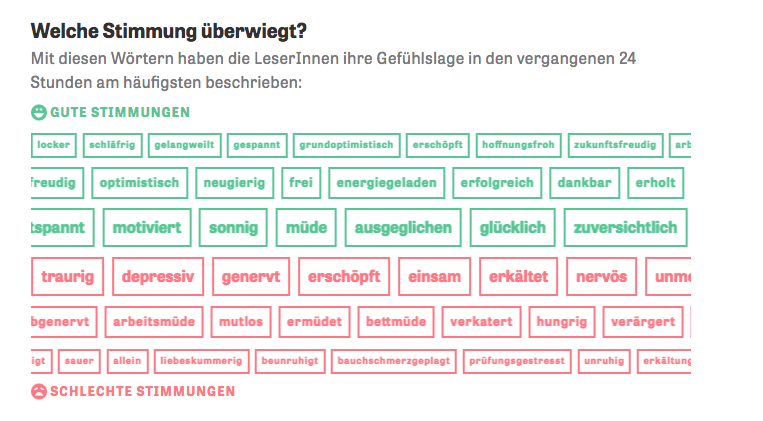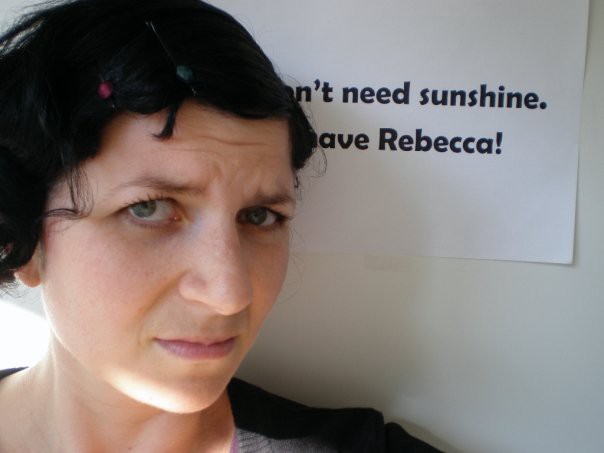How's it Going?
Deutschland über us.
The home page of the German newspaper Die Zeit contains a poll, as websites of the internet are wont to do. But there’s a twist! Instead of asking what the polls ask us in America (DO YOU TRUST OBAMA??!!) and then clicking us off to what definitely seems like a legitimate internet place that I’d like to give my email and other pertinent information to, this poll is commissioned by Die Zeit itself, and asks but one question:
Wie geht es Ihnen heute?

This query — pronounced vee GATE ess EE-nun HOY-tuh—may be familiar to anyone who has ever gone to the first day of German 101 and then had the Hose scared off them; colloquially it means “How are you today?” but literally it means “How goes it with You (the Formal ‘You’ I Don’t Know Very Well Or Who Works In a Bank) today?”
As in our culture, it is often the first thing German-speakers say when they greet each other, after Hallo or Guten Tag (or, in Austria, the excellent Servus). Pals use the informal Wie geht’s dir? and many people often abbreviate it to Wie geht’s? If you want to sound like a dork who definitely isn’t a native speaker, you can do the thing that I for some reason blurble up every fourth time I greet a German friend: Wie geht’s/wie steht’s? (vee GATES, vee STATES?). And if you want to sound like Joey from German Friends, you say: Na…wie GEHT’S denn so?
So, we’re all good on the question part. Germans, like Americans, enjoy asking each other how it’s going. CULTURAL SIMILARITY!
Here’s where it gets different. When Americans ask this question, they mean I definitely don’t care and I’m going to stop talking to you in approximately 20 seconds. When Germans ask this question, they don’t necessarily demand honesty, but they certainly won’t be surprised if that’s what they get. Indeed, I haven’t done a peer-reviewed scientific survey or anything, but I’d say the most common answer to Wie geht’s is Na ja…es geht (NA YAH, ess GATE), which basically means What the fuck ever, I’m still alive, and is definitely not how you want to answer the lady at the snack stand in 1997 if she asks you if you want ketchup with your fries, she said for no reason. (“Zat…was wrong,” laughed my friend Christoph, and then he laughed and laughed and laughed some more. I GET IT CHRISTOPH, I FUCKED UP. JEEZ.)
Here is a list of acceptable answers to the American question “How’s it going?”
1. “Great!”
In German, on the other hand, just about anything goes. Indeed, the only thing you can’t answer to Wie geht’s is ich bin gut, which literally translates to “I’m good” but actually means I am a very good person, you bastards. Whereas even accomplished grammarians such as myself regularly substitute, in English, in the adjective good for the adverb well because it’s colloquially accepted to do so and anyone who answers I am well is an insufferable pedantic fuckface, German grammar is (I think I’m gonna have a heart attack and die from nicht-Überraschung) somewhat more stringent.
To wit: the Ihnen and dir in Wie geht’s are in the dreaded dastardly Disney villain of cases, the Dative; the way you answer in full (and the reason many German 101 students hotfoot after day eins), is Es geht mir [adjective of your choice], or, if you’re being schmancy, Mir geht’s [a descriptive thing]. That means, technically “It goes [well/poorly/apocalyptic] to me,” and the dative construction signifies the ephemeral, almost Buddhist, state of one’s emotions; “it” goes with you in whatever way “it” will.
So, in German you can’t say you “are” anything (gut, schlecht, lebensüberdrüssig, schadenfroh), but you can definitely say you are feeling whatever the hell you are actually feeling, and your convo partner will not pull a face and then make a lengthy series of Tweets about Toxic Negative People In Her Life.
The German propensity for blunt honesty — and our own propensity for Being Positive even when our Republic is engulfed in a grease fire that people keep dumping water on and then going Don’t tell me not to put water on a grease fire, you elitist libloser — is what leads to statistics such as the World Happiness Report, which claims Americans are the 14th-happiest people in the whole world and Germans merely the 16th-happiest, even though they have ubiquitous bike paths and eight weeks of paid vacation a year and we have open treason in the highest office of the land, and Chicago Med.
AND YET. The Zeit poll’s results? Somewhere around 70 percent of its respondents over the past two months and counting say “it” is going gut. (The project of which this poll is a part has been active since March.) And Zeit readers are among Germany’s more intellectual (and thus grumpier), so if anything the sample is biased toward the crotchety.
Once you answer the poll, you’re then prompted to give a one-word description of your mood, and the Zeit runs a scroll of some of the responses it gets over a 24-hour period, divided into “good” and “bad.” They run the gamut from frischverliebt (FRISH-fur-LEEBT, or newly in love!) and zukunftsfreudig (TSOO-koonfts-FROY-dig, or happy for the future — jeez really?) on to arbeitsüberlastet (ARE-bites-oo-bur-last-et, or overwhelmed with work) to the somewhat redundant schlechtgelaunt (SHLEKT-guh-LOUNT, or in a bad mood).

As you can see, the Teutonically honest full range of human fee-fees is there (as well as a full list of common ailments, from Grippe, or flu, to Rückenschmerz, or backache) — but still. Seventy percent of those emotions (or lack of ailments) are positive. Germans, however dour they might seem when you’re talking to them, are happier than they sound.
But why? Are Germans like Gen-Xers, where it’s only cool to be miserable and hate everything, so they’re only comfortable revealing their secret opposite-of-shame on anonymous Internet surveys?
Are Germans the opposite of internet trolls? Or is it something even more nuanced than that, where the sort of blunt, unsmiling default es geht state is its own sort of happy? Americans are certainly better at being fake-happy — I once had to give a fake-happiness tutorial in Austria for my friends who were about to move here—but maybe real happiness has more room for, you know, scowling and telling everyone you’re having a shitty day.

Of course, this also could all be moot, and the Zeit poll’s surprising results could also just be due to the heinous bias of the survey: Shockingly, there’s no response bubble for na ja, es geht.
BONUS!!! Hey, we can do it too! Please answer this very important question.
